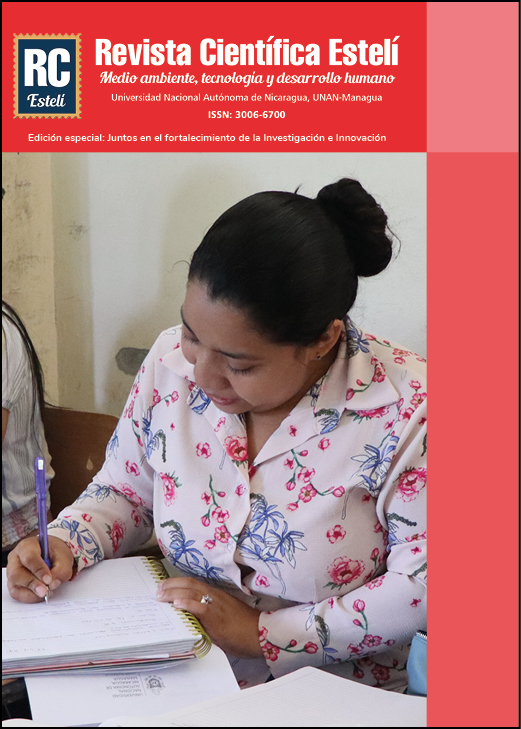The methodological route implemented by the Higher Center for Tax Studies of the General Directorate of Revenues (DGI) of Nicaragua for the development of human talent. 2013-2023
DOI:
https://doi.org/10.5377/esteli.v13i2.19818Keywords:
Training, human talent;, knowledge, public managementAbstract
Human resources management in the Nicaraguan public sector has evolved towards a comprehensive training of human talent, aligned with the modernization of public management, and within the framework of strategic planning, which defines an approach based on competencies and continuous training. The objective of this article is to describe the methodological route used by the General Directorate of Revenue (GDR) for the development of human talent, and the main results obtained during the period 2013-2023. This research is non-experimental and descriptive, with a qualitative philosophical approach. The study universe is constituted by 400 collaborators of the GDR. the sample is non-probabilistic and is focused on the collaborators who have been part of the training programs coordinated by the Higher Center for Tax Studies (HCTS) and the categories recruitment, selection and development of human resources are addressed. Three types of data collection techniques were applied: documentary research, interview and focus group. The main results show that the GDR has adopted an approach focused on the comprehensive training of its personnel to meet institutional objectives. The training of civil servants in the GDR, coordinated by the HCTS, follows a methodological route that includes competency-based selection, performance evaluation and continuous training. The methodology applied has made it possible to train competent human capital committed to continuous improvement, strengthening public management and contributing to the country’s socioeconomic development. Between 2013 and 2023, significant improvements have been observed in the performance of civil servants and institutional efficiency. It is concluded that training faces challenges such as the need for specific technical training and continuous programs adapted to labor demands.
Downloads
References
Bonilla, G. (2000). Cómo hacer una tesis de graduación con técnicas estadísticas (Cuarta edición ed.). San Salvador. https://catalogosiidca.csuca.org/Record/UNANM.76994#details
Brown, R. (2019). Validación de Instrumentos y Planificación de Recogida de Datos. Journal of Experimental Methods, 15(1), 45-68.
Calles-Santoyo, M. E., Martínez Conchos, J. L., & Ramos-Sánchez, A. (14 de junio de 2019). La cultura organizacional y el desempeño de las Instituciones de Educación Superior Públicas de México. Atenas, 4(48), 64-78. https://pf.umcc.cu/index.php/atenas/article/view/205/345
Carvajal Pérez, A. L. (19 de octubre de 2020). Gestión actual del talento humano: contexto universitario. Revista Nacional de Administración, 12(2), 1659-4908. https://www.scielo.sa.cr/pdf/rna/v12n2/1659-4932-rna-12-02-e3914.pdf
Cruz Rodríguez, E. D. (2019). Importancia del manejo de competencias tecnológicas en las prácticas docentes de la Universidad Nacional Experimental de la Seguridad (UNES). Educación, 43(1), 22. https://revistas.ucr.ac.cr/index.php/educacion/article/view/27120/36482
Dessler, G., & Varela Juárez, R. (2011). Administración de recursos humanos un enfoque latinoamericano (quinta ed.). México, México: Pearson. https://gc.scalahed.com/recursos/files/r161r/w24802w/Administraci_%B3n-de-recursos-humanos-5ed-Gary-Dessler-y-Ricardo-Varela.pdf
DGI. (2021). Plan Estratégico Institucional. 2022-2026. Dirección General de Ingresos de Nicaragua. Managua, Nicaragua: Dirección General de Ingresos de Nicaragua. Retrieved 2 de octubre de 2023, from https://www.dgi.gob.ni/pdfInfo/PlanEstrategico
GRUN. (2021). El Plan Nacional de Lucha contra la Pobreza y para el Desarrollo Humano 2022-2026. Gobierno de Reconciliación y Unidad Nacional. Managua: GRUN. https://observatorioplanificacion.cepal.org/sites/default/files/plan/files/PNCL-DH_2022-2026%2819Jul21%29_0.pdf
Guevara Alban, G. P., Verdesoto Arguello, A. E., & Castro Molina, N. E. (2020). Metodologías de investigación educativa (descriptivas, experimentales, participativas, y de investigación-acción). RECIMUNDO, 4(3), 163-173. https://doi.org/10.26820/recimundo/4.(3).julio.2020.163-173
Hernández Sampieri, R., Fernández Collado, C., & Baptista Lucio, P. (2010). Métodología de la investigación.5ta Edición. McGRAW-HILL / INTERAMERICANA EDITORES, S.A. DE C.V. https://doi.org/https://jalintonreyes.files.wordpress.com/2013/05/sampieri-5a-edicic3b3n-roberto-et-al-metodologc3ada-de-la-investigacic3b3n.pdf
Hernández Sampieri, R., Fernández Collado, C., & Baptista Lucio, P. (2014). Métodología de la investigación.5ta Edición. McGRAW-HILL / INTERAMERICANA EDITORES, S.A. DE C.V.
Hurtado, J., & Toro, J. (2007). Paradigmas y Métodos de Investigación. Caracas: Clemente Editores C.A.
Jara Martínez, A. M., Asmat Vega, N. S., Alberca Pintado, N. E., & Medina Guzmán, J. J. (20 de junio de 2018). Gestión del talento humano como factor de mejoramiento de la gestión pública y desempeño laboral. Revista Venezolana de Gerencia, 23(83), 740-760. https://www.redalyc.org/journal/290/29058775014/html/
Johnson, K. (2020). Análisis Final en Investigación Científica. Scientific Analysis Review, 30(4), 567-589.
Jones, P., & García , S. (2018). Diseño Metodológico: Planificación y Protocolo Experimental. Research Methods Journal,, 10(2), 67-89.
Oliveira, H. H., & Honório, L. C. (2 de marzo de 2020). Prácticas de recursos humanos y compromiso organizacional: Asociando. Revista de Administración Mackenzie, 21(4), 1-28. https://doi.org/10.1590/1678-6971/eRAMG200160
Pérez Panduro, S., & Flores, E. (15 de abril de 2022). Gestión de recursos humanos en el sector público de América latina,. Ciencia Latina Revista Científica Multidisciplinar, VI(2). https://ciencialatina.org/index.php/cienciala/article/download/2141/3113/
Pires, M. L., & Nunes, F. (2018). El rol mediador de la virtuosidad en la gestión de recursos humanos y los resultados del trabajo. Revista de Administración de Empresas, 58(4), 380-392. https://doi.org/http://dx.doi.org/10.1590/S0034-759020180404
Robbins, S. P., Coulter, M., & DeCenzo, D. A. (2017). Fundamentos de administración. México D.F., México: Pearson Educación de México. https://www.marcialpons.es/libros/fundamentos-de-administracion/9786073239622/
Sánchez Macias, R. A., Moposita Ledesma, S. L., & Yunda García, H. R. (2020). La capacitación y el desempeño laboral de los servidores públicos de la Gobernación de la Provincia Bolívar en el año 2019. Guaranda: Universidad Estatal de Bolívar. Facultad de Ciencias Administrativas, Gestión Empresarial e Informática. Carrera de Ingenierìa Comercial. Retrieved 9 de agosto de 2023, from file:///C:/Users/kandino/Downloads/Proyecto%20de%20Titulaci%C3%B3n%20PDF..%20(1).pdf
Smith, J., Johnson, A., García, M., & Brown, R. (2017). Exploración de Campo en la Investigación Científica. Journal of Scientific Research, 25(3), 123-145.
Villarreal Ugarte, E. (30 de junio de 2018). La gestión estratégica de los recursos humanos en las administraciones públicas: la profesionalización del servidor público. Perfiles de las Ciencias Sociales, 6(11), 86-101. https://revistas.ujat.mx/index.php/perfiles/article/download/3119/2340/15603
Viteri Rade, L. Y., & Franco Villon, M. N. (29 de Julio de 2022). El desarrollo organizacional a través del talento humano. E-IDEA Journal of Business Sciences, 4(17), 30-44. https://revista.estudioidea.org/ojs/index.php/eidea/article/view/233/317
Zamora Castillo, A. M. (2019). Análisis de la gestión estratégica de la formación profesional del Recurso Humano en la Administración Tributaria durante el período 2014-2018, para propuestas de mejora. Universidad Nacional Autonoma de Nicaragua. UNAN-Managua, Facultad de Ciencias Economicas. Managua, Nicaragua: UNAN-Managua. https://repositorio.unan.edu.ni/12227/1/22345.pdf
Downloads
Published
Issue
Section
License
Copyright (c) 2024 Revista Científica Estelí

This work is licensed under a Creative Commons Attribution-NonCommercial-ShareAlike 4.0 International License.

